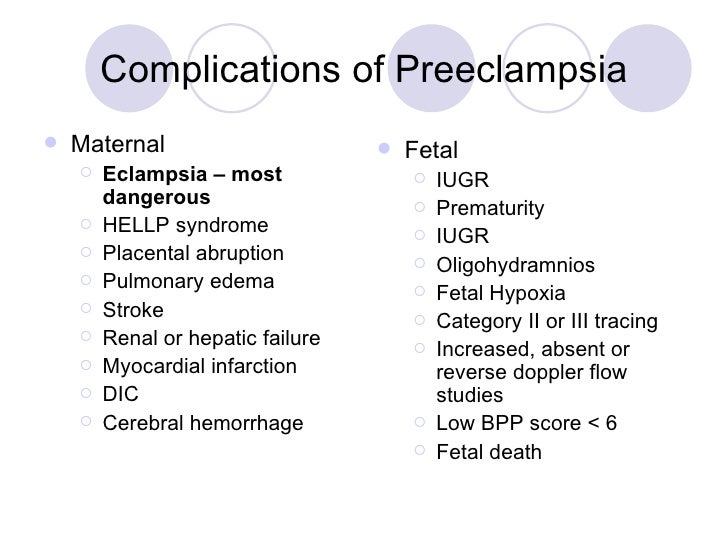2 If the fetus is not delivered these conditions can cause the death of the mother andor the fetus. Though not part of any formal diagnostic criteria hyperuricemia is classically a biomarker indicating progression of gestational or chronic hypertension to preeclampsia and of risk for fetal and maternal complications such as SGA.
Preeclampsia can keep your placenta from getting enough blood which can cause your baby to be born very small.

Complications of preeclampsia. Eclampsia This is a severe form of preeclampsia that leads to seizures in the mother. 3 Infants born preterm due to preeclampsia face a higher risk of some long-term health issues mostly related to being born early including learning disorders cerebral palsy epilepsy deafness and blindness. Seizures in eclampsia may cause a woman to lose consciousness and twitch uncontrollably.
This chapter addresses therapy for pregnant women with chronic hypertension and focuses on pharmacologic management that may diminish risk of superimposed preeclampsia. Severe maternal complications include antepartum hemorrhage due to placental abruption eclampsia cerebrovascular accidents organ failure and disseminated intravascular coagulation DIC. Renal Complications of Preeclampsia.
Seizure Prophylaxis for Preeclampsia. The clinical presentation is highly variable but hypertension and proteinuria are usually seen. These include HELLP syndrome 13 14 disseminated intravascular coagulopathy and acute renal failure.
Often presenting as new-onset hypertension and proteinuria during the third trimester preeclampsia can progress rapidly to serious complications including death of both mother and fetus. Preeclampsia is classified as mild and severe. Complications of Pre-eclampsia The course of pre-eclampsia can be complicated by mild to severe coagulopathy even in the presence of a normal platelet count.
Maternal complications of severe preeclampsiaeclampsia can be serious leading to maternal fetal and neonatal morbidity and mortality. In severe cases preeclampsia can develop into eclampsia which includes seizures. It is mild in 75 of cases and 25 presented as severe.
Preeclampsia is sometimes manifested by severe systemic hypertension. Antihypertensive Therapy for Severe Preeclampsia. Hemodynamic Monitoring for Preeclampsia.
Acute Complications of Preeclampsia ERROL R. These systemic signs arise from soluble factors released from the placenta as a result of a response to stress of syncytiotrophoblast. REPKE MD Departments of Obstetrics Gynecology Brigham Womens Hospital Harvard Medical School Boston Massachusetts and University of Nebraska Medical Center University of Nebraska Medical School Omaha Nebraska.
NORWITZ MD PhD CHAUR-DONG HSU MD MPH and JOHN T. If preeclampsia is not treated quickly and properly it can lead to serious complications for the mother such as liver or renal failure and future cardiovascular issues. This is called fetal growth restriction.
209212 However in all-comers uric acid levels do not predict development of preeclampsia. Neurologic Complications of Preeclampsia. In some cases preeclampsia can lead to organ failure or stroke.
Preeclampsia in particular is one of the most feared complications of pregnancy. There may also be increased risk of maternal complications including. Delivery of the placenta remains the only cure but years after a pregnancy complicated by preeclampsia women are at increased risk of chronic hypertension diabetes mellitus ischemic heart disease cerebrovascular disease kidney disease thromboembolism hypothyroidism and even impaired memory.
Its also one of the most common causes of. Delivery of the placenta remains the only cure but years after a pregnancy complicated by preeclampsia women are at increased risk of chronic hypertension diabetes mellitus ischemic heart disease cerebrovascular disease kidney disease thromboembolism hypothyroidism and. In extreme cases the disease can lead to kidney and liver failure DIC and central nervous.
Preeclampsia and eclampsia have the potential to produce significant maternal and fetal complications. Cardiopulmonary Complications of Preeclampsia. Infants whose mothers had preeclampsia are also at increased risk for later problems even if they were born at full term 39 weeks of pregnancy.
Pre-eclampsia is a common disorder that particularly affects first pregnancies. It may also lead to the following life-threatening conditions.

